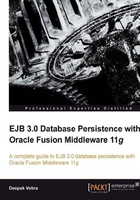
In EJB 2.x, a session bean is required to implement the SessionBean interface. An EJB 3.0 session bean class is a POJO (Plain Old Java Object) and does not implement the SessionBean interface.
An EJB 2.x session bean class includes one or more ejbCreate methods, the callback methods ejbActivate, ejbPassivate, ejbRemove, and setSessionContext, and the business methods defined in the local/remote interface. An EJB 3.0 session bean class includes only the business methods.
In EJB 3.0, EJB component interfaces and home interfaces are not required for session beans. A remote interface in an EJB 2.x session EJB extends the javax.ejb.EJBObject interface; a local interface extends the javax.ejb.EJBLocalObject interface. A home interface in an EJB 2.x session EJB extends the javax.ejb.EJBHome interface; a local home interface extends the javax.ejb.EJBLocalHome interface. In EJB 3.0 the home/local home and remote/local interfaces are not required. The EJB interfaces are replaced with a POJI (Plain Old Java Interface) business interface. If a business interface is not included with the session bean class, a POJI business interface gets generated from the session bean class by the EJB server.
An EJB 2.x session EJB includes a deployment descriptor that specifies the EJB name, the bean class name, and the interfaces. The deployment descriptor also specifies the bean type of Stateless/Stateful. In EJB 3.0, a deployment descriptor is not required for a session bean. An example EJB 2.x session bean, which implements the SessionBean interface, is listed next:
import javax.ejb.SessionBean;
import javax.ejb.SessionContext;
public class CatalogBean implements SessionBean {
private SessionContext ctx;
public String getJournal(String publisher) {
if (publisher.equals("Oracle Publisher"))
return new String("Oracle Magazine");
if (publisher.equals("OReilly"))
return new String("dev2dev");
}
public void ejbCreate() {
}
public void ejbRemove() {
}
public void ejbActivate() {
}
public void ejbPassivate() {
}
public void setSessionContext(SessionContext ctx) {
this.ctx = ctx;
}
}
In EJB 3.0, metadata annotations are used to specify the session bean type and local and remote business interfaces. A stateless session bean is specified with the annotation @Stateless, a stateful session bean with the annotation @Stateful. Component and home interfaces are not required for a session bean. A session bean is required to implement a business interface. The business interface, which is a POJI, may be a local or remote interface. A local interface is denoted with the annotation @Local and a remote interface is denoted with the annotation @Remote. A session bean may implement one or both (local and remote) of the interfaces. If none of the interfaces is specified, a local business interface gets generated. The remote and local business interface class may be specified in the @Local and @Remote annotations. For example, a local business interface may be specified as @Local ({CatalogLocal.class}).
The EJB 3.0 session bean corresponding to the EJB 2.x stateless session bean is annotated with the metadata annotation @Stateless. The EJB 3.0 bean class does not implement the SessionBean interface. The EJB 3.0 session bean implements a business interface. The @Local annotation specifies the local business interface for the session bean. The EJB 3.0 session bean corresponding to the EJB 2.x example session bean is listed next:
import javax.ejb.*;
@Stateless
@Local( { CatalogLocal.class })
public class CatalogBean implements CatalogLocal {
public String getJournal(String publisher) {
if (publisher.equals("Oracle Publisher"))
return new String("Oracle Magazine");
if (publisher.equals("OReilly"))
return new String("java.net");
}
}
In EJB 3.0, the component and home interfaces of EJB 2.x are replaced with a business interface. The business interfaces for the session bean are POJIs, and do not extend the EJBLocalObject or the EJBObject. A local business interface is denoted with the annotation @Local. A remote business interface is denoted with the annotation @Remote. A remote business interface does not throw the RemoteException. The local business interface corresponding to the session bean class is listed next:
import javax.ejb.*;
@Local
public interface CatalogLocal {
public String getJournal(String publisher);
}
A client for an EJB 2.x session bean gets a reference to the session bean with JNDI. The JNDI name for the CatalogBean session bean is CatalogLocalHome. The local/remote object is obtained with the create() method. The client class for the EJB 2.x session bean is listed.
import javax.naming.InitialContext;
public class CatalogBeanClient {
public static void main(String[] argv) {
try {
InitialContext ctx = new InitialContext();
Object objref = ctx.lookup("CatalogLocalHome");
CatalogLocalHome catalogLocalHome = (CatalogLocalHome) objref;
CatalogLocal catalogLocal = (CatalogLocal) catalogLocalHome
.create();
String publisher = "OReilly";
String journal = catalogLocal.getJournal(publisher);
System.out.println("Journal for Publisher: " + publisher + " "
+
journal);
} catch (Exception e) {
System.err.println(e.getMessage());
}
}
}
In EJB 3.0, a reference to a resource may be obtained with a dependency injection with the @EJB annotation. JNDI lookup and create() method invocation is not required in EJB 3.0. The client class for the EJB 3.0 session bean is listed next:
public class CatalogClient {
@EJB
CatalogBean catalogBean;
String publisher="OReilly";
String journal=catalogBean.getJournal(publisher);
System.out.println("Journal for Publisher: "+publisher +" "+journal);
}